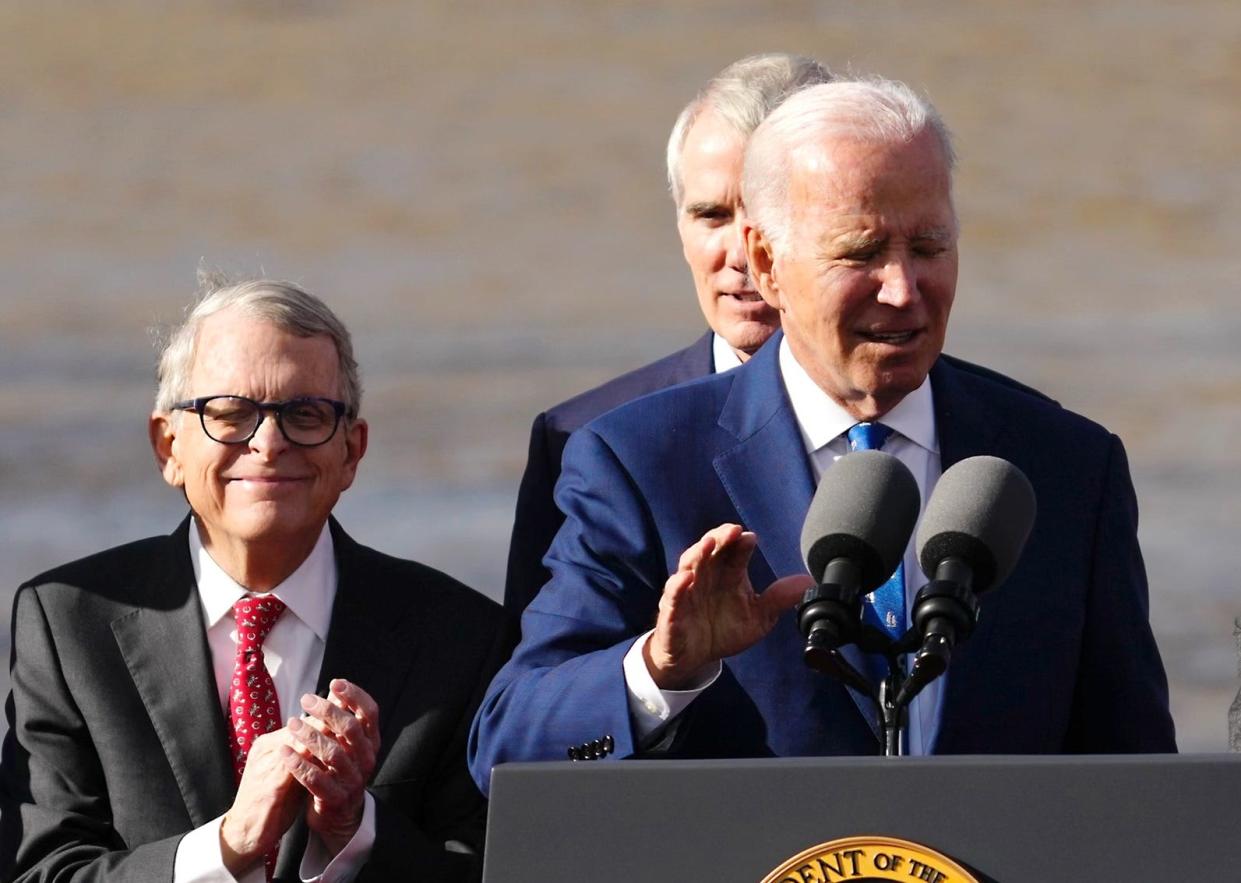Statehouse lawmakers made Ohio a laughingstock and exposed dysfunction before eyes of nation

- Oops!Something went wrong.Please try again later.
Thomas Suddes is a former legislative reporter with The Plain Dealer in Cleveland and writes from Ohio University. tsuddes@gmail.com
The Ohio General Assembly has drawn praise for what in 49 other states would be considered a given: Doing its job.
Yes, thanks to a hard nudge from Republican Gov. Mike DeWine, the legislature, also Republican, passed a bill that should clear the way for Joe Biden, Democrats’ presumptive presidential nominee, to appear on Ohio’s ballot.
The measure, House Bill 2 of a special legislative session DeWine called, delays to Sept. 1, from Aug. 7, the deadline for Democrats to certify to Ohio’s secretary of state that Biden will in fact be Democrats’ 2024 nominee.
Ohio a laughingstock
The Aug. 7 deadline was a problem because the Democratic National Convention won’t meet in Chicago until Aug. 19 (through Aug. 22). Had Democrats not met the original Aug. 7 deadline, Biden couldn’t appear on Ohio’s ballot.
If anything, positive emerged from the falderal, it was to call national attention to the GOP-run General Assembly’s dysfunction and partisanship, making Ohio – on a good day – a laughingstock.
Still, to their credit, the GOP ringmasters of this circus, House Speaker Jason Stephens, of Lawrence County, and Senate President Matt Huffman, of Lima, got-r-done.
32 Republicans voted to keep Biden off the ballot
That doesn’t mean someone won’t run to a courthouse, county or federal, to gum things up. Still, for now, Biden will be on the ballot, though according to polling Trump — at the moment — could comfortably capture Ohio’s electoral vote in November.
Remarkably, even though the Biden ballot bill in effect assured Ohioan of an opportunity to readily exercise their right to vote, 32 Republicans in the General Assembly voted “no” on the Biden ballot bill.
Given inevitable confusion at polling places over write-in voting procedures, requiring write-ins would arguably amount to depriving some of Ohio’s potential Biden voters — there were 2.7 million in Ohio in 2020 — of their rights.
Even so, central Ohio legislators who voted “no” on the Biden ballot bill were Republican Reps. Thad Claggett and Kevin Miller, both of Newark; Jay Edwards, of Nelsonville; Darrell Kick, of Loudonville; Beth Lear, of Galena; and Brian Stewart, of Ashville.
Yost and the foreign donations ban
Meanwhile, the special legislative session also passed House Bill 1, an attempt to ban foreign contributions to Ohio ballot issue campaigns.
To cut through the fog, a number of Statehouse Republicans think the ban could gum up potential a couple November statewide ballot issues that’d ban the gerrymandering of General Assembly districts and would increase Ohio’s minimum wage. (Hey: Don’t Ohioans love their legislature just the way it is? And so what if the last time that per capita income in Ohio matched the nation’s was 55 years ago, in 1969, when Richard M. Nixon had just moved into the White House?)
As passed by legislators and signed by DeWine, the H.B. 1 foreign donations ban also gives Republican Attorney General David Yost, an all-but-announced candidate for governor in 2026, exclusive power to enforce it, instead of the bipartisan Ohio Elections Commission, which is composed of three Republicans, three Democrats and one independent.
The Elections Commission was established by the General Assembly in the wake of the federal Watergate affair. Coincidentally, an early challenge to the commission’s power was filed by DeWine growing out of his victorious 1976 campaign for Greene County prosecuting attorney – his first public office. The Ohio Court of Appeals (10th District) upheld the Elections Commission law.
The Dispatch reported in 1977 that the commission said “DeWine [had allegedly] violated the [Elections Commission] act by publishing a brochure contending [the Democratic incumbent] had ‘lost’ cases sent to the grand jury that did not result in indictments.”
DeWine said through a spokesman he believes the 1977 complaint was dropped. In June 2014, in an unrelated case, the U.S. Supreme Court unanimously ordered lower courts to reconsider the constitutionality of Ohio’s “false statement” law, and Judge Timothy Black of U.S. District Court for Southern Ohio then struck it down.

Yost, designated by his fellow Republicans to keep foreigners from donating to Ohio issue campaigns, is a master of self-publicity. Meanwhile, the General Assembly is starving the Elections Commission.
Not counting seven part-time commissioners (annually paid $25,000 each), the commission has a three-person staff, and the General Assembly has budgeted just $625,000 it – in a state with thousands of elected officials: As to good government, Ohio isn’t exactly the heart of it all.
Thomas Suddes is a former legislative reporter with The Plain Dealer in Cleveland and writes from Ohio University. tsuddes@gmail.com
This article originally appeared on The Columbus Dispatch: Ohio GOP dysfunction put in spotlight thanks to Joe Biden ballot fiasco

